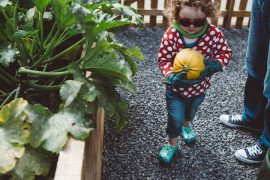The same study also looked at teenagers and discovered that grateful teens (ages 14-19) were more satisfied with their lives, used their strengths to help others and improve their community, did better at school and engaged more in their hobbies, and were less envious, depressed, and materialistic than other less grateful teens.
7 keys to parenting grateful kids
Froh and Bono suggest 7 ways to encourage gratitude in our kids.
- Model and teach it – Expressing gratitude through words, writing, and small gifts or acts of reciprocity.
- Spend focused time with your kids – being present when you’re with your children helps you maintain empathy towards them. By doing this you are modelling empathy, the most important emotion for developing gratitude and moral behaviour.
- Firm but flexible parenting style – this improves family relationship and atmosphere at home, and helps bring out the children’s strengths and talents, all good for making grateful kids.
- Use strengths to fuel gratitude – encourage and help your children to use their strengths to thank and be kind to others.
- Help kids achieve intrinsic goals – instead of materialistic goals focused on wealth, possessions or status, help your kids engage in activities that provide a sense of contributing or belonging to their community, and growth towards being an independent person.
- Encourage generosity and thoughtfulness – helping others and being generous are two key ingredients for making grateful kids.
- Help kids find what matters to them – the deepest sense of gratitude in life comes from connecting to a bigger picture, to an issue that matters to others and doing things that contribute to society down the road.
(If you want some practical ideas, Froh and Bono’s book Making Grateful Kids has 32 concrete, scientifically-based strategies for encouraging gratitude in children.)
Three simple gratitude exercises for Christmas
- Say it. Set an alarm on your phone for 3-5 times a day. When it goes off, quickly name one thing each that you are grateful for at that time. What’s going well? What are you feeling thankful for right now?
- Give it. Choose a charity you feel thankful for. Are you grateful to the people at the SPCA for caring for animals in your community? Are you glad there are people helping the elderly in your area? Decide together how you can show your gratitude-it might be a financial gift, or an action.
- Write it. Ask your kids to choose a person they are grateful to: a friend, family member, favourite author, or teacher and write them an email to express their gratitude. (We’ve emailed thankyou notes to a number of our favourite authors and they usually email back which is exciting too!)
One of my favourite bloggers, Oh Amanda, has some great practical ideas too about helping kids have a giving attitude at Christmas.
I am personally very grateful to YOU for reading my little blog. I have had some wonderful, kind feedback this year. So, thank you and I hope you have a very merry Christmas!
Originally published here.
Kelly Eden is a single mum and ex-teacher, and has for the past decade been a parenting writer for national magazines in New Zealand. She specialises in child development, childhood behaviour and psychology, highly sensitive children, and the science that helps us feel more empowered in our very important role as parents. Join her in learning more about this incredible parenting life. Kelly is also on Pinterest.










